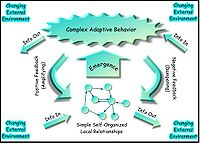
Photo from wikipedia
Investigating how genes jointly affect complex human diseases is important, yet challenging. The network approach (e.g., weighted gene co-expression network analysis (WGCNA)) is a powerful tool. However, genomic data usually… Click to show full abstract
Investigating how genes jointly affect complex human diseases is important, yet challenging. The network approach (e.g., weighted gene co-expression network analysis (WGCNA)) is a powerful tool. However, genomic data usually contain substantial batch effects, which could mask true genomic signals. Paired design is a powerful tool that can reduce batch effects. However, it is currently unclear how to appropriately apply WGCNA to genomic data from paired design. In this paper, we modified the current WGCNA pipeline to analyse high-throughput genomic data from paired design. We illustrated the modified WGCNA pipeline by analysing the miRNA dataset provided by Shiah et al. (2014), which contains forty oral squamous cell carcinoma (OSCC) specimens and their matched non-tumourous epithelial counterparts. OSCC is the sixth most common cancer worldwide. The modified WGCNA pipeline identified two sets of novel miRNAs associated with OSCC, in addition to the existing miRNAs reported by Shiah et al. (2014). Thus, this work will be of great interest to readers of various scientific disciplines, in particular, genetic and genomic scientists as well as medical scientists working on cancer.
Journal Title: Scientific Reports
Year Published: 2017
Link to full text (if available)
Share on Social Media: Sign Up to like & get
recommendations!